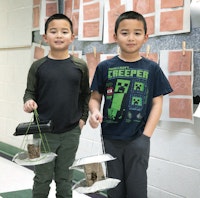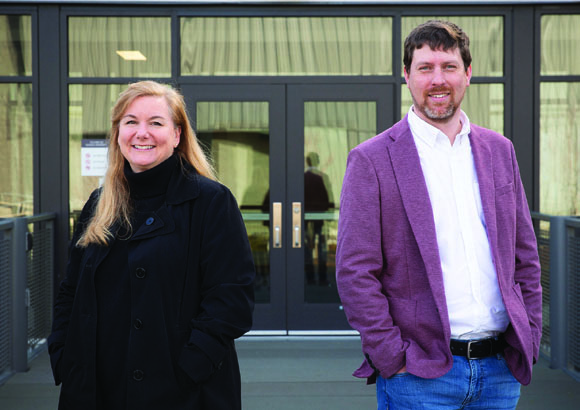Students go hands-on with Science to Go kits

What does it take to make it rain? Why do trees grow so tall? Why do some volcanoes explode?
Instead of watching a video of their science teacher explaining such experiments, students in kindergarten through fifth grade at the district's three elementary schools are getting to conduct the experiments themselves every week thanks to Science to Go kits.
The kits, distributed monthly, contain all that's needed to conduct weekly science projects.
When elementary science specialist Marcus Knowles, who teaches science to all K-5 students district-wide, started the school year, his science packets included links to videos and a list of supplies students would need to complete assignments. He knew this was not necessarily viable for all.
"I just kept shaking my head thinking no one has all this stuff at home," he said. "It could easily be done at school if we were meeting in person, but I knew not all parents would have the time, or resources, to shop for all the supplies. And even ordering on Amazon could take weeks. Time we didn't have."
Knowles had researched science subscription boxes, much like produce boxes that are delivered to homes, and wondered if Anacortes could create its own version. His goal was to start deliveries in January 2021, but he quickly realized from desperate teacher and parent emails that it needed to happen much sooner.
But how to pay for it? Director of Teaching and Learning Angie Miller recommended Anacortes Schools Foundation (ASF).
"I've never gotten a faster yes in my life," Knowles said. "I nearly cried."
Gathering materials for one or two classes of 20 is fairly easy, but to tackle every student in the district, 950+, requires an entire community. Our town is one that comes together to find a solution and believes all kids should have access to learning and to engaging lessons, he said
"What's been amazing is that everyone said yes. Instantly. It makes us all feel like we're a part of something bigger," he said.
As much as possible, supplies are purchased locally through Bayshore Office Products, Sebo's and Safeway.
Each kit contains four, some-times five, weekly outlines, work-sheets and video links, assess-ments, and printouts of science articles (in lieu of attaching a link for students to read on-screen), and all the materials necessary for the experiments.
To fund the 960 kits each month, ASF earmarked $24,000 in total, much of which was donated by Marathon Petroleum as part of ASF's annual Celebrate the Season Auction. Shell's Fuel for Education Fun Run covered the November kits and Strandberg Custom Homes and Design sponsored the December kits.
Executive Director Marta McClintock said the project is exactly what the foundation's mission is all about.
"These kits allow all students at Fidalgo, Island View and Mt. Erie to do the science. They re-move barriers, financial or other, and make enriched learning accessible for all," she said. "We're thrilled to support this program."

ASF Executive Director Marta McClintock and elementary science specialist Marcus Knowles have teamed up this year to provide science kits to elementary students to create at home.
Each month, 15 to 18 ASF volunteers mask up and spend several hours assembling the kits, which are delivered to the el-ementary schools and then made available for families to pick up. Kits are prepared for individual grade levels and are based on the Mystery Science curriculum.
Feedback has been overwhelmingly positive from both teachers and families. Not only has the consistency of students' work increased, but both quality and quantity have improved as well.
"Kids who were struggling before we started Science to Go are now completing their assign-ments and sharing their results with pride," Knowles said.
Mt. Erie second graders Eli and Ethan Wong love the "mystery" of how their experiments will turn out and think it's "cool and fun" to actually do the experiments instead of just watching someone else have fun on Zoom.
Their mom Alexis Weise has enjoyed seeing her two sons happily and independently apply their science learning to other projects.
"One week's lesson taught about starting with a proto-type and later making design improvements based on initial performance. I love how my boys are using this thinking with other assignments," Weise said. "We're so grateful to Mr. Knowles, the district, ASF and the community for generously supplying these kits during this year of remote learning."
Elementary science will be taught virtually through the end of the year. Knowles said this un-precedented situation has opened up new possibilities for teachers.
"We're throwing some things out and trying things we'd never have dreamed of before," he said.

